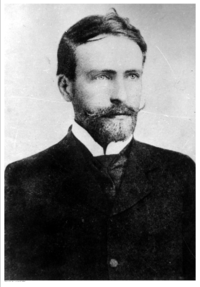The Wedding (1901 play)

The Wedding (
The play's action takes place at the wedding of a member of the Kraków intelligentsia (the Bridegroom) and his peasant Bride. Their crossclass union follows a then fashionable trend of chłopomania ("peasant-mania") among some Polish intelligentsia, who were often scions of the historic Polish szlachta (nobility).[1][2]
Wyspiański's play was inspired by a real-life event: the wedding of the poet and playwright
Plot
A poet marries a peasant girl.[4] A wedding reception follows at the bride's village house. In adjoining rooms, guests get into arguments, make love, or rest from their merriment, dancing, and feasting.[5]
Among the live guests are ghosts of personae from Polish history and culture, representing the guilty consciences of the living. The two groups engage in dialogues. The wedding guests are hypnotized by a rosebush
Wernyhora presents the Host with a golden horn symbolizing the national mission, and calls on the Polish people to revolt. A farm hand is dispatched to sound the horn at each corner of Poland, but he soon loses the horn.[8] Thus the wedding guests, symbolizing the nation, waste their chance at national freedom. They keep on dancing a "chocholi taniec" (a "straw-wrap's dance") "the way it's played for them" (a Polish folk saying),[9] failing in their mission.
Legacy

The Wedding, a leading
The Wedding is considered the last great classic of Polish drama. Rochelle Heller Stone writes that it "alone [has] earned [Wyspiański] the title of fourth bard" - the fourth most important figure in Polish poetry, after Adam Mickiewicz, Juliusz Słowacki, and Zygmunt Krasiński.
The 2004 film The Wedding, by Wojciech Smarzowski, also relates to The Wedding.[11][12]: 184 [13]: 14
See also
References
- ^ "Stanisław Wyspiański, "Wesele"". Retrieved 17 April 2020.
- ^ "Stanisław Wyspiański". Retrieved 17 April 2020.
- ^ ""Wesele" Wyspiańskiego z pogranicza snu i jawy". Retrieved 17 April 2020.
- ^ "Ocena narodu polskiego. Chłopi a inteligencja w Weselu - Wesele - Stanisław Wyspiański". poezja.org (in Polish). Retrieved 2023-08-12.
- ^ "Wesele - streszczenie - Stanisław Wyspiański". poezja.org (in Polish). Retrieved 2023-08-12.
- ISSN 2450-5544.
- ^ "Wernyhora (Wesele) - charakterystyka – Stanisław Wyspiański, Wesele - opracowanie – Zinterpretuj.pl" (in Polish). 2022-02-07. Retrieved 2023-08-12.
- ^ "Wesele - streszczenie – Wesele - opracowanie – kochamjp.pl" (in Polish). 2023-08-09. Retrieved 2023-08-12.
- ^ "Chocholi taniec i jego symbolika - Wesele - Stanisław Wyspiański". poezja.org (in Polish). Retrieved 2023-08-12.
- ^ "Andrzej Wajda". Retrieved 17 April 2020.
- ^ "Przeczytaj - Zintegrowana Platforma Edukacyjna". zpe.gov.pl. Retrieved 2023-08-12.
- ISBN 978-90-420-0113-8.
- ISBN 978-0-520-30326-3.
